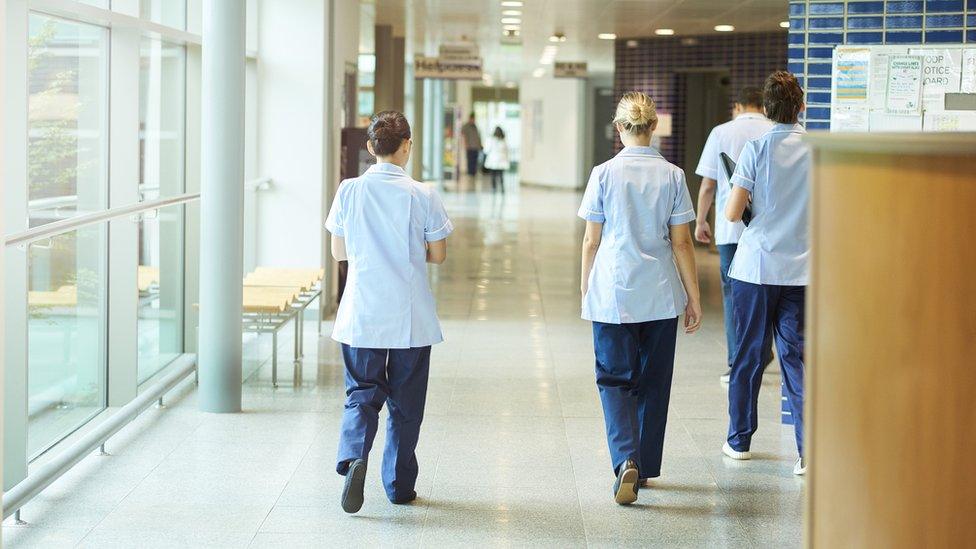NHS Scotland staff accept minimum 9% pay rise
- Published
- comments

Nurses, midwives and paramedics in Scotland are to receive a minimum pay rise of 9% over three years after a new pay deal was accepted.
The deal, for those who earn under £80,000 a year, is linked to terms and conditions reforms.
Members of the GMB union voted to reject the deal, however it will go through after being overwhelmingly backed by the other unions.
Health Secretary Jeane Freeman said it was the UK's "highest health uplift".
She said: "This rise - which is linked to a commitment to reform some terms and conditions - will be up to 27% for some staff.
"This pay rise can help recruitment and retention and ensure that our NHS remains an attractive employment option for many."

The Scottish government said the deal would benefit 147,000 staff under the health service's agenda for change pay system.
It is not relevant to doctors, dentists or senior managers.
The offer has been accepted by unions including Unison, Unite and the Royal College of Midwives.
Thomas Waterson, chairman of the Unison health committee, said: "Today I am pleased to announce that 94% of Unison members have voted to accept a pay deal which will put an additional £400m into NHS workers' pay packets in Scotland.
"This deal delivers real increases of between 3% and 27% for NHS workers in Scotland."
'Pay stagnation'
Emma Currer, from the Royal College of Midwives (RCM) Scotland, said: "The RCM is pleased that our members have accepted this pay offer.
"It means that midwives, maternity support workers and other hardworking NHS staff in Scotland can finally begin to recoup the losses they incurred after years of pay freezes, pay stagnation and uplifts well below inflation."
But the GMB said 98% of its members in the NHS and Scottish Ambulance Service (SAS) voted to reject the offer and it disputed the 9% figure.
The union's senior organiser Drew Duffy said: "We said from the outset this offer was unfair and unequal, and while it is very disappointing this offer will be implemented, we won't be silent on the facts.
"We campaigned for an above- inflation offer and measures to tackle a decade of cuts. The truth is that 3%, 2.7% and 2.6% does not equal 9%, nor does it begin to match the cost of living.
"The interlinked elements of this offer also mean that staff across the NHS, particularly the lowest paid, are like sitting ducks for further cuts to their terms and conditions of employment."
Direct negotiations
Following their acceptance of the deal, Unison called for the Scottish government to break away from the UK's NHS pay review body, which negotiates with health unions on behalf of the NHS across the UK.
It wants Scottish ministers to set up pay negotiating structures directly with NHS unions in Scotland.
Due to unique circumstances, this year is the first that Unison and other health unions have submitted a pay claim directly to the Scottish government.
Unison said this came about after years of staff being given 1% pay rises when it went through the NHS Pay Review Body.
As the NHS is devolved, this allowed the Scottish unions and the Scottish government to agree to take the Barnett benefits of the UK deal and tailor them to suit Scotland.

What is the Barnett formula?

Since the late 1970s the Barnett formula has been used to determine annual changes in the block grant to each nation of the UK
When there is a change in funding for devolved services in England, for example health or education, the Barnett formula aims to give each country the same pounds-per-person change in funding
But the formula is not set out in law, and in practice the Treasury decides how to apply it
The UK government also provides other grants to devolved administrations outside of the block grant, which are not covered by Barnett
These grants are for less predictable demand driven spending, and are negotiated between the UK government and devolved administrations

Mr Waterson said: "The strong endorsement [of the deal] by Unison members makes it clear that we do not need to wait cap in hand for the pay review body. This institution as it stands is dead in the water.
"Eighteen months ago some people said that we couldn't negotiate a separate pay deal for NHS workers in Scotland. Then they said that we couldn't negotiate a better deal for Scotland.
"The Scottish government should commit now to develop negotiating structures in Scotland and allow us to self determine on pay."
Many staff have already been given a 3% pay rise for the current year, which was announced by Nicola Sturgeon at the SNP conference.
More than a million NHS workers in England are receiving a three-year pay deal worth 6.5% after staff voted in favour of that offer in June.
- Published25 June 2018
